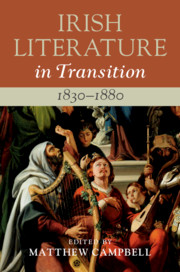Book contents
- Irish Literature in Transition, 1830–1880
- Irish Literature in Transition
- Irish Literature in Transition, 1830–1880
- Copyright page
- Contents
- Contributors
- Series Preface
- General Acknowledgements
- Acknowledgements
- Part I Contexts and Contents: Politics and Periodicals
- Part II Ireland and the Liberal Arts and Sciences
- Chapter 4 Naming the Place: The Ordnance Survey and Its Afterlives
- Chapter 5 Political Economy? The Economics and Sociology of Famine
- Chapter 6 Newman’s Irish University
- Chapter 7 The Charms of Ireland: Travel Writing and Tourism
- Part III From the Four Nations to the Globalising Irish
- Part IV The Languages of Literature
- Index
Chapter 5 - Political Economy? The Economics and Sociology of Famine
from Part II - Ireland and the Liberal Arts and Sciences
Published online by Cambridge University Press: 29 February 2020
- Irish Literature in Transition, 1830–1880
- Irish Literature in Transition
- Irish Literature in Transition, 1830–1880
- Copyright page
- Contents
- Contributors
- Series Preface
- General Acknowledgements
- Acknowledgements
- Part I Contexts and Contents: Politics and Periodicals
- Part II Ireland and the Liberal Arts and Sciences
- Chapter 4 Naming the Place: The Ordnance Survey and Its Afterlives
- Chapter 5 Political Economy? The Economics and Sociology of Famine
- Chapter 6 Newman’s Irish University
- Chapter 7 The Charms of Ireland: Travel Writing and Tourism
- Part III From the Four Nations to the Globalising Irish
- Part IV The Languages of Literature
- Index
Summary
The principles of political economy that informed the Russell government’s measures to terminate the Famine crisis were broadly addressed in journalism, political and economic pamphlets, but also in literature. As this chapter shows, fiction, in particular, engaged with three aspects of political economy: the government’s politics of non intervention, the Malthusian discourses that many supporters of political economy employed and the stereotype of Irish indolence by which the ideology of political economy was often imbued. As will be demonstrated, the fact that these works of literature responded to these societal discussions on the Irish Question is accompanied by generic shifts. In examining the Famine present or past, these literary texts explored the boundaries of genre, developing new fictional registers and forms.
Keywords
- Type
- Chapter
- Information
- Irish Literature in Transition, 1830–1880 , pp. 78 - 91Publisher: Cambridge University PressPrint publication year: 2020

